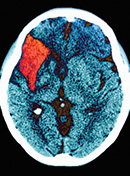|
NEW! Follow us on
 
Advertisement

|
 |
| Editor's Notebook |
Getting the Word Out
The pitfalls of polypharmacy are widely known. As the specialty pharmacy market grows, so too should the effort to communicate potential interactions. |
 |
| Counseling Pearls |
 Medical Cannabis: Pharmacy Focus on Treatment Options for Neurologic Conditions Medical Cannabis: Pharmacy Focus on Treatment Options for Neurologic Conditions
Medical marijuana and its components are being successfully used to lessen seizure activity, treat pain and muscle spasticity, provide neuroprotection, reverse neuronal damage, and reduce symptoms of Parkinson's disease, amyotrophic lateral sclerosis, and several other neurologic conditions via important effects on the endocannabinoid system. |
 Narcolepsy: Evolutions in Pharmacotherapy Narcolepsy: Evolutions in Pharmacotherapy
Current therapy for this complex neurologic disease is limited to symptom management and does not affect the underlying process. Recognition and a better understanding of the role of autoimmunity in type 1 narcolepsy have provided a means for early diagnosis, thus creating the potential for new interventions. |
| |
| Senior Care |
Hearing Impairment: Age- and Drug-Related Causes
Ototoxic drugs are a common cause of hearing loss when taken regularly, especially in older adults. Patients, family members, and caregivers stand to benefit from early identification of hearing and balance problems and the preventative measures by pharmacists regarding medication-related potential causes. |
| |
| Clinical Corner |
 Muscular Dystrophy: Options for Complication Management Muscular Dystrophy: Options for Complication Management
Patients with muscular dystrophy often suffer from cardiac and respiratory complications, as well as impairments in neurologic function. Treatment of the disorder focuses mainly on prevention and management of complications. Early diagnosis and appropriate, timely therapy have been demonstrated to prolong life expectancy. |
 Early Management of Acute Ischemic Stroke: Focus on IV tPA and Timely Reperfusion Early Management of Acute Ischemic Stroke: Focus on IV tPA and Timely Reperfusion
Alteplase, an IV tissue plasminogen activator (tPA), is the only FDA-approved thrombolytic agent for this condition. Recently updated American Heart Association/American Stroke Association guidelines and revisions to product labeling have expanded the time window eligibility for tPA treatment and have loosened contraindications surrounding its use. |
| |
| Consult Your Pharmacist |
Nonprescription Treatment Options for Migraine
It is important for pharmacists to understand when and how to use OTC products for the management of migraines as well as when patients require referral to their healthcare provider. Combination products are more effective than any of the components alone in comparable doses. |
| |
| Educational Spotlight |
A Therapeutic Review of Chronic Constipation
Diet and lifestyle modifications are the first steps in the primary management of this common condition. |
Antipsychotics and Neuroleptic Malignant Syndrome
Treatment involves the discontinuation of the offending agent and supportive therapy. |
Regulatory and Safety Issues in Compounding
Recently enacted/proposed rules aim to prevent events such as the 2012 distribution of contaminated injectables by a compounding pharmacy. |
| |
|
 |
| Newswire |
 |
 |
Stricter Vicodin Regulations Significantly Reduce Use
Washington, DC—
According to a Department of Health and Human Services analysis of IMS Health data, moving Vicodin and similar hydrocodone combination products from schedule III to the more restrictive schedule II on the federal controlled substances list was associated with 26.3 million fewer prescriptions in the first year following the rescheduling. This is a 22% drop from the 3 years before the change. Most of the decline was attributed to difficulty in obtaining refills. This policy change will likely have a dramatic impact on the opioid crisis. Future research is needed to examine whether these changes are sustained over time and if they are associated with reductions in abuse, addiction, and overdose. |
 |
 |
Free Nicotine Patches Improve Smoking Cessation Rate
Toronto, Canada—
A new Canadian study shows that mailing free nicotine-replacement patches to smokers more than doubled their chance of quitting. Researchers at the Centre for Addiction and Mental Health in Toronto mailed a 5-week course of nicotine patches to 500 smokers who had expressed interest in quitting. Participants were not offered any behavioral counseling to enhance their quitting efforts. Overall, 2.8% of patients who received the free patches reported not having smoked for the past 6 months, compared to 1% of those who had not received any patches. The results show that the convenience of having patches delivered directly to them may be an added incentive for some highly motivated smokers to finally quit. |
 |
 |
Is Earlier Colorectal Cancer Screening Beneficial?
Ann Arbor, MI—
Researchers at the University of Michigan Comprehensive Cancer Center have discovered that 15% of colorectal cancers are diagnosed before the recommended screening age of 50 years. Younger patients were also more likely to have advanced disease and receive more aggressive treatment. To put this in perspective, <5% of invasive breast cancers occur in women under that age. These finding suggest the need for more awareness of the warning signs and family history of the disease. Due to concerns over the costs versus the benefits of testing sooner, it is too early to tell if colonoscopy guidelines should be changed to begin screening at an earlier age. |
 |
 |
|